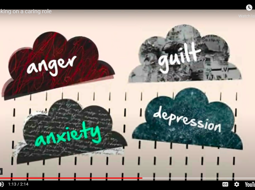Caring for someone with a disability
If you have a disability caused by a condition, accident or health issue, adapting to everyday life and facing our society's norms can pose many challenges.
If you're looking after someone in this situation, it may be reassuring to know that there are many sources of support and help offered by professionals and others who can relate to what you're going through.
Where can I find specialist support?
Organisations like Mencap and Living Made Easy specialise in providing services and support that can help with day-to-day living and independence, from arranging suitable breaks away, to finding the right equipment to helping with access needs.
They can offer a wide range of resources, practical advice and support for everyone living with the challenge of a disability from dealing with physical restrictions to navigating issues around learning, hearing or sight.
Here are some useful links:
Resources and guides to help if you're looking after someone living with a learning disability (from Mencap)
mencap.org.uk/advice-and-support
Information about care services (from Living Made Easy)
livingmadeeasy.org.uk/category/care-services
AskSARA (from Living Made Easy):
This tool enables you to source equipment and items to help with disabilities:
equipu.livingmadeeasy.org.uk/about-ask-sara
If you have a specific query, you may find these services helpful:
Mencap
The Mencap Helpline:
mencap.org.uk/advice-and-support/learning-disability-helpline
Disability Law Service
Disability Law service advice support:
https://dls.org.uk/free-advice/
Brain & Spine Foundation
Helpline:
Helpline | Support For You | Brain & Spine Foundation (brainandspine.org.uk)
Note: when people or loved ones call the helpline on 0808 808 1000, they will be talking directly to a neuron specialist nurse.
You may need support for your own wellbeing too.
Mencap
Support for carers of adults with a learning disability: mencap.org.uk/advice-and-support/social-care/support-carers-adults-learning-disability
Mencap
Support for parents and carers of children and young people with a learning disability
mencap.org.uk/advice-and-support/children-and-young-people/support-parents-and-carers-children-and-young-people
Scope – support for when you are no longer around to care for someone:
scope.org.uk/advice-and-support/care-after-someone-dies
Scope – support groups https://www.scope.org.uk/advice-and-support/support-groups-parents
RNIB
https://www.rnib.org.uk/
RNID
https://rnid.org.uk/
Brain & Spine Foundation
Joining a support group:
https://www.brainandspine.org.uk/support-for-you/peer-support-groups/
Being a neuro carer:
Neuro Carers | Support For You | Brain & Spine Foundation (brainandspine.org.uk)
Carers UK
Our free Carers UK Care for a Cuppa sessions also offer an opportunity to connect with other carers, and you can find out more about relevant topics through our Share and Learn sessions:
Our guides and sources of support
We would recommend turning to condition specific charities to gain specialist guidance on supporting someone with different disabilities. However we can offer some general suggestions that could help you assist someone without putting your own health at risk.
How can I support them with moving around?
If you need to help someone move around, for example to get to and from the toilet, it's important that you also look after your own health and body as the repetitive strain of this could lead to an injury or poor health.
Read our guidance on looking after your body and see the section on manual handling for tips on how to help someone safely. We suggest some ways to prevent an issue from arising, but if you are aware of any problems surfacing, it is advisable to speak to your doctor and get additional support.

Support with making decisions
If someone you care for might need help with managing their affairs now or in the future, you could consider the different ways in which you could help make important decisions on their behalf. Watch the video below for ideas, options and tips.
Support with day-to-day life
You may feel it's now necessary to alter the home or consider accessories, tech and equipment to help someone who may be having to adapt to living with restricted movement or a disability. This section of our website offers some ideas to help: Technology and equipment | Carers UK.
A good starting point for getting extra support is to arrange a needs assessment if they haven't had one already. The term for this may differ depending on where you live, but essentially this is a review of someone's needs, looking at what will help improve their day-to-day life.
As an unpaid carer, you may also be eligible for a needs assessment. If you are struggling with health issues and are under strain, you can also request a needs assessment for yourself. You can have this as well as a carer’s assessment.
Depending on where you live, there may be a waiting list for this support. It is worth checking with your local authority or health and social care trust (in Northern Ireland).
Arranging care for someone
If you reach a point, where you need additional support to look after someone, there are various options to consider. Everyone's circumstances are different so it may be a case of trial and error at first. However we hope to make these difficult decisions easier for you by providing lots of guidance and information to help you make informed choices.
Using a care agency can be more expensive than employing a care worker directly, but there are certain responsibilities to fulfil if you are taking on the role of an employer to recruit someone directly. See our online pages for more information and guidance:
Fore more information about finding care agencies, see this page.
For more information about directly employing a care professional, see this page.
You can explore other options on our arranging care for someone page.
How do I take time out?
If you feel in need of a break, you should not feel guilty about arranging one. Often, it is easier to put the needs of those we care for before our own.
See our webpage, Taking a break, for some ideas on how to take some time out. On this page, you can also download a factsheet which provides a list of organisations that can help with offering a break or support you to seek respite care.
Connecting with others
You can connect to our forum, Carers Connect, to read what others have experienced and search for useful terms to find a relevant thread, such as 'disability needs': take a look here.
To post topics or join a conversation on Carers Connect, you need to become a member first. This is free and can give you access to lots of additional support in case you need it: join us.





